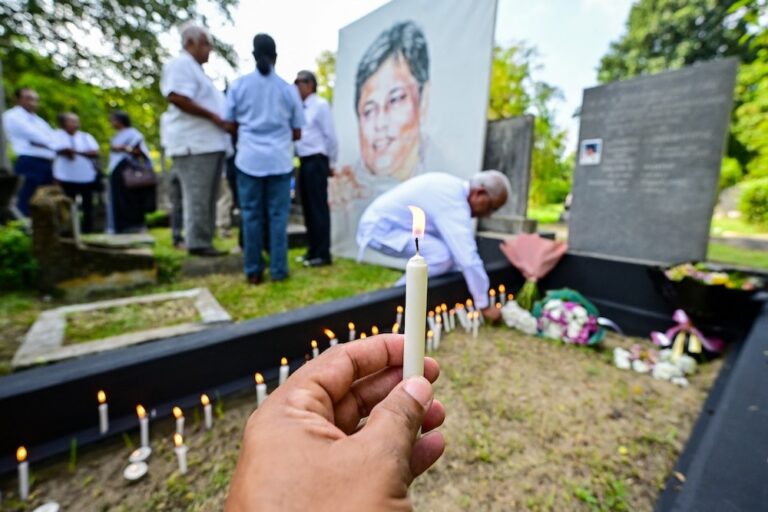(FMM/IFEX) – The following is a 7 December 2006 FMM press release: Statement on the New Emergency Measures The public security and anti-terrorism measures introduced by the government this week are potentially extremely negative for freedom of speech and expression in Sri Lanka. The new emergency regulations – Emergency (Prevention and Prohibition of Terrorism and […]
(FMM/IFEX) – The following is a 7 December 2006 FMM press release:
Statement on the New Emergency Measures
The public security and anti-terrorism measures introduced by the government this week are potentially extremely negative for freedom of speech and expression in Sri Lanka.
The new emergency regulations – Emergency (Prevention and Prohibition of Terrorism and Specified Terrorist Activities) Regulations – enacted on 6th December 2006 contain several novel features that need to be further clarified in order to meet international standards of appropriate balance between freedom of expression and its limitations on the grounds of national security and the prevention of terrorism.
The Free Media Movement (FMM) expresses its serious concern regarding the enactment of these regulations, which we strongly feel may result in censorship and the violation of human rights, restrict the space and ability of civil society to engage in conflict resolution, and the further erosion of media freedom. (Please visit the link below to read the new regulations:
http://www.freemediasrilanka.org/index.php?action=con_news_full&id=389§ion=news )
The prevention of terrorism is a legitimate aim for any democratic government, and legally defining terrorism and specifying terrorist activities that necessitate penal sanctions is, in principle, justified and necessary.
However, extreme caution must be exercised to ensure that such measures are not vague or overbroad for the purposes for which they are enacted, and such restrictions on constitutionally protected rights they impose must always be proportionate to the harm sought to be averted. In other words, anti-terrorist measures cannot themselves essentially undermine democratic values and basic standards of constitutional government.
The FMM is deeply concerned, therefore, that the new regulations, which are in addition to those already in operation, attempt to define terrorism in extremely broad terms and, in their enactment, potentially pose a serious threat to democratic governance and fundamental rights in Sri Lanka.
We note that the latest proclamation is at pains to posit itself within the nature and scope of legitimate anti-terrorism measures as set out in the UN Security Council Resolution No. 1373 of 2001. Nevertheless, given the long history of emergency-related abuse of power in Sri Lanka, there are several points of serious concern with regard to the new regulations.
In particular, we would note the impermissibly wide scope of the range of activities prohibited by Regulations 2, 3 and 4 and the definition of terrorism in Regulation 16 (i). These provisions are couched in very vague language, allowing for the possible criminalisation of a range of democratically legitimate activities including the roles of media and civil society, and would clearly infringe constitutionally protected fundamental rights including freedom of expression.
The prohibition on “transactions” with persons or organisations identified as terrorists by the new regulations is subject to an exemption (first proviso to Regulation 4), whereby persons may engage in approved transactions with persons or organisations designated as terrorists – with written permission of the Competent Authority (appointed under Regulation 11).
This is a sweeping power that is highly susceptible to abuse as well as governmental control of a free media and civil society. Similarly, the new feature of an appeals tribunal (Regulations 13 and 14) cannot be expected to perform the role of an independent reviewer of executive action, given that the body is composed of Ministry Secretaries.
Taken together, it is inconceivable that such a broad conferral of powers can be exercised without imminent abuse and violation of fundamental rights, especially in the context of the current, challenging security environment.
Finally, FMM seeks clarification regarding the operation of the Prevention of Terrorism Act (PTA). While no proscription or further regulations under the PTA have been announced at this stage, the President in his address to the nation on 6th December stated that the government has decided to reactivate the provisions of the PTA. Given the undertaking by the government of Sri Lanka not to exercise certain aspects of its powers under the PTA in terms of the Ceasefire Agreement of February 2002, it would be helpful if the government could clarify the precise implications of its decision to reactivate the PTA.
We strongly ask the government to clarify the points noted herein urgently and hasten to strengthen democratic governance and fundamental rights in Sri Lanka.


